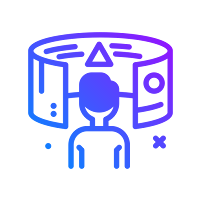Role of Technology in Human Development
Technology has played a significant role in human development, enhancing access to information and communication, advancing healthcare, boosting economic development, and improving education. The internet and social media have enabled easy access to information and communication, while technology has led to significant advancements in healthcare and new job opportunities. Additionally, technology has improved access to education, providing personalized learning experiences and better tracking of progress. However, it is essential to ensure that technology is developed and used responsibly and ethically to minimize risks and maximize benefits for all individuals.
Emerging
Technologies that can enhance Human Skills.
VR technology can create immersive
and realistic simulations that can help individuals develop and enhance various
skills. For example, in medical training, VR can be used to simulate surgical
procedures, allowing trainees to practice and perfect their skills in a safe
and controlled environment. Similarly, in aviation training, VR can be used to
simulate complex flight scenarios and emergency situations, helping pilots
improve their skills and decision-making abilities.
AR technology can overlay digital information on the real world, providing individuals with real-time feedback
and guidance. For example, in manufacturing, AR can be used to provide workers
with instructions and guidance for assembling complex machinery, helping them
to complete tasks more efficiently and accurately. Similarly, in healthcare, AR
can be used to overlay patient data onto the real world, providing doctors and
nurses with vital information and improving patient outcomes.
AI can be used to analyze large amounts of data and provide insights that can help individuals make better decisions and improve their skills. For example, in language learning, AI-powered apps can analyze a student's progress and provide personalized feedback and recommendations for improvement. Similarly, in finance, AI can be used to analyze market data and provide investors with insights and recommendations for making better investment decisions.
Robots can be used to perform tasks
that require high levels of precision and accuracy, freeing up humans to focus
on tasks that require more creativity and problem-solving skills. For example,
in manufacturing, robots can perform repetitive tasks such as assembly or
painting, allowing workers to focus on more complex tasks such as design and
engineering. Similarly, in construction, robots can be used to perform tasks
such as laying bricks or pouring concrete, improving efficiency and accuracy.
BCIs can be used to allow individuals to control machines and devices using their thoughts. This technology has the potential to greatly enhance the quality of life for individuals with disabilities or injuries, allowing them to regain mobility and control. For example, BCIs can be used to control prosthetic limbs or wheelchairs, allowing individuals to perform everyday tasks more easily and independently.
"In
today's world, humans are increasingly relying on a variety of technology tools
to enhance their daily lives. Some of the most popular and trending tools
include smartphones, virtual assistants like Amazon's Alexa and Google
Assistant, cloud computing services, augmented and virtual reality
technologies, and wearable technology such as fitness trackers and smartwatches. These tools are transforming the way we communicate access
information, perform tasks, and interact with the world around us, and as
technology continues to evolve, we can expect to see even more innovative tools
that will further improve our daily lives."
These
emerging technologies have the potential to greatly enhance human skills and
capabilities in a variety of fields, from healthcare to manufacturing to
finance. By leveraging these technologies, individuals can improve their skills,
work more efficiently, and achieve better outcomes.
The impact of these technologies on our lives and society.
Improved
Efficiency: Technologies such as AI, IoT, and cloud computing have made
businesses more efficient by automating processes and reducing the need for
human intervention. This has resulted in cost savings, faster response times,
and improved productivity.
Enhanced
User Experience: Technologies such as virtual and augmented reality have
created new and immersive experiences for users, improving their engagement and
satisfaction.
Increased
Connectivity: Technologies such as 5G and IoT have created a more connected
world, enabling real-time communication and collaboration between devices,
machines, and people.
Enhanced
Security: Technologies such as biometric authentication and blockchain have
improved security by providing secure and transparent methods of identity
verification and transaction recording.
Improved
Healthcare: Technologies such as AI and IoT have improved healthcare by
enabling remote monitoring, early diagnosis, and personalized treatment.
Increased
Accessibility: Technologies such as voice recognition and assistive technology
have improved accessibility for people with disabilities, enabling them to
perform tasks that were previously difficult or impossible.
Reduced
Environmental Impact: Technologies such as renewable energy, smart grid, and
smart transportation have reduced the environmental impact of human activities,
contributing to a more sustainable future.
These
technologies have had a profound impact on our lives and society, enabling us
to be more connected, efficient, and sustainable. However, they also raise ethical
and social issues that need to be addressed to ensure that the benefits are
shared equitably and responsibly.









Comments
Post a Comment